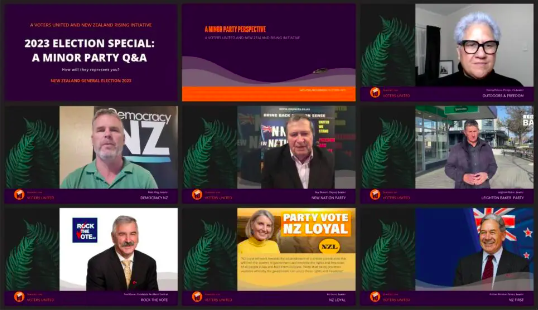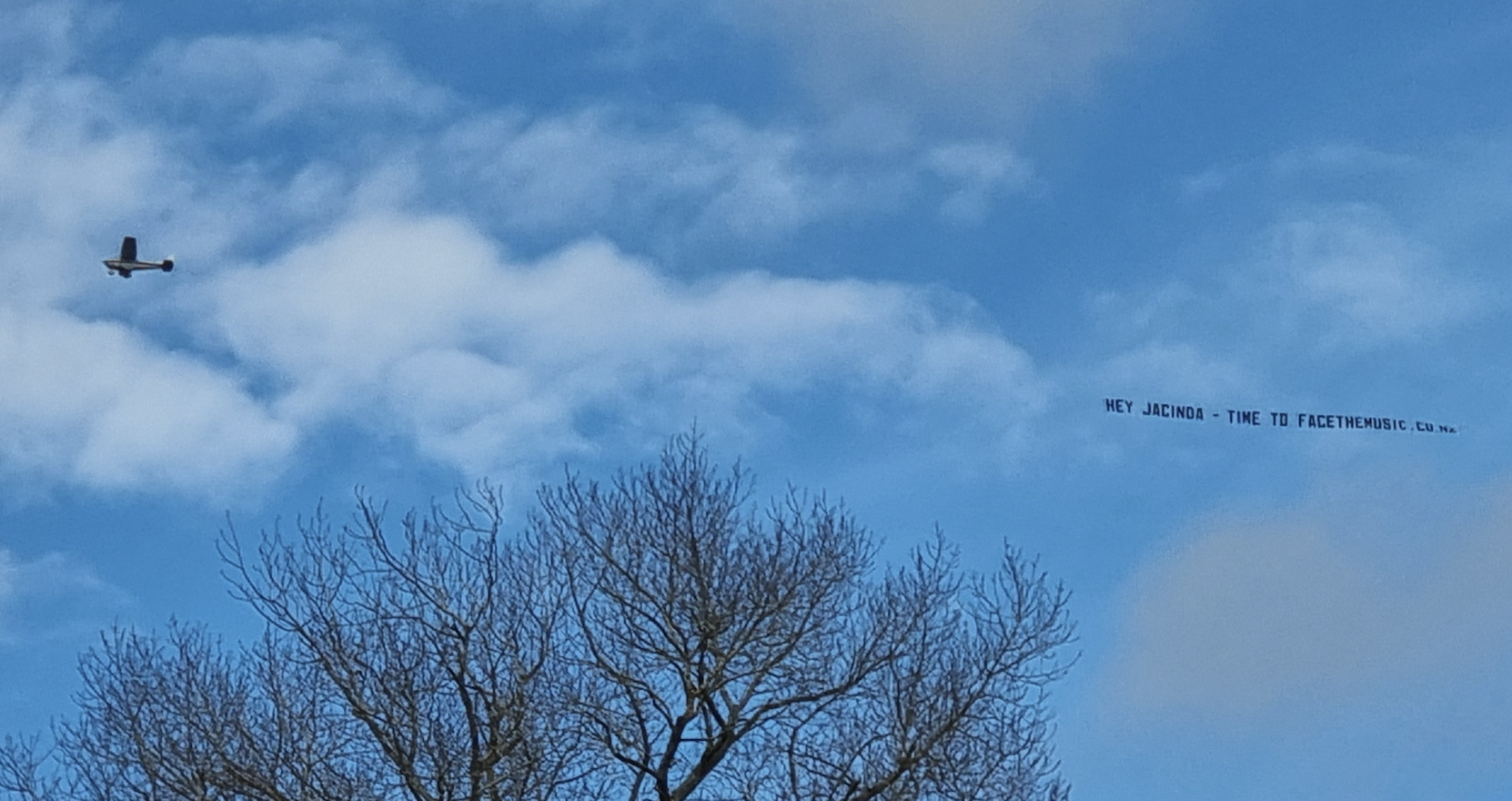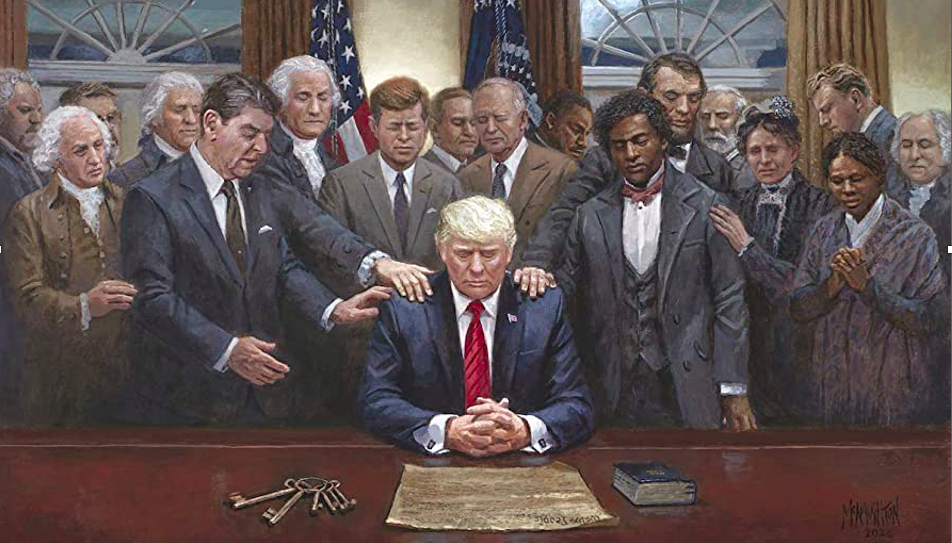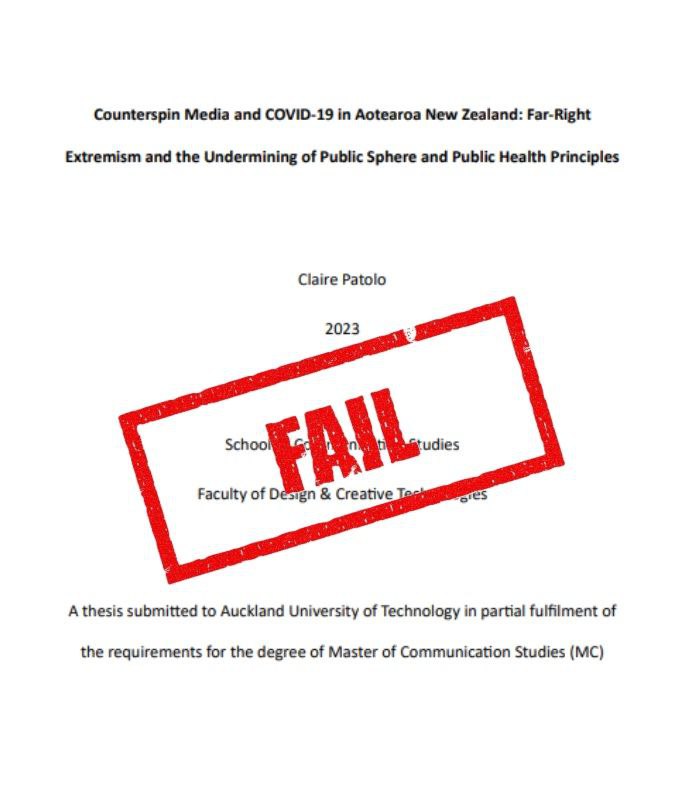
Who Should I Vote For? I just watched ten Voters United videos (twice) so you don’t have to
By Mike Bee
Voters United grew out of the fact that in the last election minor parties were strongly supported by New Zealand voters but scored no seats because their votes were spread over so many different parties. The Green Party had a similar number of votes to the sum total of the minor parties’ votes but came away with ten seats; the Act Party won less votes than the minor parties but also captured ten seats. It was therefore the hope of many Kiwis – myself included – that all minor parties would be able to unite well before the election and that voters’ second vote for their party of choice could be at a level that would seriously challenge the major parties.
The perfect strategy for winning seats through uniting seemed to be the umbrella party idea, but for it to be successful it had to be fronted by a leader or leaders who had wide appeal. With the umbrella party, candidates could campaign under their own party’s name so that voters could see the different qualities of each party, but the party vote itself would go into a collective from which ranked members would be chosen. The only umbrella party to make any waves was Freedoms NZ, which became a coalition of the NZ Outdoors and Freedom Party, Vision and Rock the Vote NZ.
The fatal flaw in Freedoms NZ was that Brian Tamaki, quite irrespective of his real worth as an individual, simply was not respected by enough New Zealanders to be one of the leaders of it. If Leighton Baker, who early on is rumoured to have been asked to do the job, had stepped up and become co-leader with Sue Grey or Liz Gunn, this could have worked, and Tamaki could have remained a force in the background. When such a move was still possible, I wrote the article, How To Fix a Leaky Umbrella, which unfortunately gained no traction. Members of Freedoms NZ only saw it as criticism of their leader, although it was really a heart-felt appeal to adopt a strategy that could work for all New Zealand. Freedoms NZ, despite much hard work from its followers and some brilliance in areas such as criminal justice reform, has remained on low numbers. It is a sad fact that the Freedoms NZ umbrella concept has not opened as it could have.
All this is now water under the bridge. There were other reasons that the parties could not unite, despite the fact that the overwhelming majority of New Zealanders who identify with the truth or freedom movement wanted this to happen. Matt King in one of the videos in collection that Voters United has created ventures to suggest that it is politically naive to think that parties can unite – he had tried very hard to bring people together but found there were as many differences between the smaller parties as there were similarities. Politics brings out strong individualities, and uniting these would never be easy. The fact that Guy Slocum’s New Nation Party was a member of the Freedoms NZ coalition but pulled out over differences of opinion among those in leadership roles bears witness to that. People just had to assert their individuality this time round and put a stamp on who they were. All party leaders believe they are the ones who would rise to the top of the heap. Yet many Kiwis still lament that unity could not be achieved.
Now that this has been done in an election that has been part of a political awakening for many who, till now, had not paid elections much attention, could something approaching an umbrella party be pulled off next time round?
Note that when I say, “next time round”, I do not mean in three years’ time but much sooner than that, for the world is turning dramatically against the globalist powers, and all the major parties in this country are in some way captives to the will of would-be globalist dictators. Whatever happens this October, I do not expect globalism to continue to be a force after the US Elections in 2024. The leaders of National and Labour have committed crimes which are slowly coming to light. Can Labour be what it is today when some of its leaders are locked up for lying to the New Zealand people and for the grievous harm that they have done to this country? National, Act, the Greens … all the major parties have played a part in deceiving the public. Truth always comes out in the end – it is unfortunate that it seems that this will be after these 2023 elections. But when the majority of Kiwis understand the past rightly, they will surely demand something different. Could it be that the small parties have been discovering themselves for a future role well before the next scheduled elections of 2026?
That is a thought for the future, but for now, we must look at what we have. The New Zealand General Election of 2023 consists of a fragmented collection of ten “minor” parties. They are the real carriers of democracy in this country, the real major parties, for they carry the vision of a new New Zealand that will flourish when the present scoundrels are gone. They get very little attention from a mainstream media committed to maintaining the status quo at all costs, and they are illegally censored on social media, and so they languish, fearlessly championed by a few, but unknown to many.
It is, therefore, a very helpful aid on the Voters United website – https://votersunited.nz/special-initiative/ – to give the minor parties ten questions and have them deliver their answers one after the other. This is how the questions are introduced:
Identified as the most important election of a lifetime, we seek to provide voters with the often unheard voices of the minor parties.
If you watch the ten separate videos for the ten different questions, you’ll know that sentence by heart – it is spoken ten times!
Seven parties are represented and there are eight spokespersons, with Donna Pokere-Philipps and Sue Grey sharing answers for the NZ Outdoors and Freedom Party. The other speakers are:
Matt King for Democracy NZ, speaking in person,
Guy Slocum for the New Nation Party, speaking in person,
Leighton Baker for the Leighton Baker Party, speaking in person,
Paul Davie for Rock the Vote – his voice recorded,
An unknown voice reading for Liz Gunn, NZ Loyal, and
Lee Donoghue reading for Winston Peters, NZ First.
The five leaders whom you see while they are speaking make a much stronger impression than the three who merely read. It is unfortunate that the two whom I consider to be the two most significant leaders in the country, Winston Peters and Liz Gunn – and I don’t mean just the most significant in the minor parties, but the most significant in the whole country – have both provided statements read by others rather than appearing themselves. These two have an authority in their speaking that cannot be denied and the exercise would have been far richer if they had been there rather than someone else standing in for them.
Each party-leader has his or her own style. Matt King and Leighton Baker are by far the strongest, speaking off the cuff rather than reading prepared statements and each in their own way saying a lot in a short time and giving the impression that they are real leaders who are sincere and who have valuable beliefs that could take this country into a new era. After Jacinda and Chippy and faced with the probability of Humpty Dumpty to come, what we would not give to have a real Kiwi no-nonsense male taking hold of the reins of our country! Guy Slocum speaks more slowly and resembles Winston Churchill assuring the Brits that, “We shall fight them on the beaches!” Donna Pokere-Philipps labours over her words but does come up with a great invention in the word “monumentous” (video 10). Sue Grey, though speaking well, as we expect of her, must have been having a bad makeup day, her face at one point resembling that of Mrs Doubtfire in the scene where the latter puts her head into a night-mask of egg-white and sugar. The other three make no visible impression as you only hear voices reading.
If this is done again, all parties should participate more fully, so that the impression we gain from the five listed above can extend to the others also.
The impression we get from the five is of their personalities. We want to know who they are, and, on some levels, what we see is a persona, however something definitely is able to be revealed. Ignoring the inevitable questions that we cannot know from such an exercise and admitting in advance that by listening to their words we will not know if their second cousin really is a Freemason or if their wife once had an affair with the son of the American ambassador to Peru, what do these people actually say?
Not every topic of importance is here covered. There is nothing about co-governance, taxation and the economy, abortion, New Zealand’s energy and a New Zealand Constitution. However the ten questions are a sample of topics that are relevant to truth and freedom-loving Kiwis. Each leader is asked for his or her party’s position regarding:
1. The protection of New Zealanders’ rights and freedoms;
2. The World Economic Freedom and its influence on New Zealand;
3. The World Health Organization and its influence on New Zealand;
4. The present “climate emergency” and what they would do about it;
5. The Labour government’s covid 19 emergency response and whether there needs to be an enquiry;
6. Government mandates and the Therapeutic Products Act;
7. New Zealanders’ rights to free speech and the role of the media;
8. Our education system and parents’ right to be involved;
9. The 5% threshold in this election
10. Whether they would concede in favour of another party if polls indicate they are not going to score above the 5% threshold.
Each question is a separate video, so that we are quite glad that there are not more speakers. (I make here the assumption that there would be few desperate to know what the leader of the Cannabis Party thinks about our country’s education policies.) Only Brian Tamaki (co-leader of Freedoms NZ) and Hannah Tamaki (leader, Unity Party) could have been included but weren’t.
The first thing to note is that, despite the differences in personality as given above, the answers are not really too dissimilar.
Being particularly concerned with this country’s covid 19 emergency response and the need for there to be an enquiry, I turned immediately to this. Encouragingly, all candidates replied that they would push for a full enquiry. (Well, you reply, in a questionnaire for truth and freedom voters, they would all say that wouldn’t they!) One answer shone out for me, and I am going to quote it in full. It is the statement from NZ Loyal:
Q: Does your party support a full and independent inquiry into the Covid-19 emergency response? What will your party do to support this?
A: Not only does New Zealand Loyal support a full and truly independent enquiry into the covid 19 emergency response, but we also want a criminal investigation into the scam that took place that covers every aspect, including but not limited to, communications, financial transactions, agreements and contracts, fraud, crimes against humanity and treason. This is what New Zealand Loyal will demand.
That, to me, was a nice use of language in a short statement, but in actual fact all the leaders say something similar, and all want enquiries, either by Royal Commission or of some other kind. Leighton Baker adds the sensible suggestion that before anything else is done there needs to be a New Zealand-wide tour of a team that will get legal affidavits from people who have been harmed by the medical procedure. He goes well beyond NZ Loyal to give the most complete account of everything that this enquiry would involve.
Some speakers are inclined to talk longer than others. In future, if this is repeated one day, I would hope that Voters United sets up strict time limits. In other topics, much good sense is spoken, but that is exactly the point that Voters United wishes to make. Despite what Matt King has said above, from what we hear of them answering these questions, the small parties have far more in common with each other than they have differences. For example, every one of them stands for Kiwi sovereignty and against the incursions into it from overseas organisations. Earlier, people without clear information made a lot of trouble by accusing different parties of not having such policies, though this could easily have been checked by putting a little time into visiting the party’s website.
Will this election be like the one in 2020? This is the big question, and it will be easier to answer, of course, after the election. It is likely that New Zealand First will get over the 5% threshold and have a good number of seats. New Zealand Loyal, which has extraordinary loyalty from a growing number of supporters, is also making considerable progress. If the election were three months later, I would expect great things from them, but with the deadline looming are they running out of time? Both Matt King and Leighton Baker make it clear that they are not in the business for crossing the 5% threshold for party seats but are looking to win individual electorates.
This brings up another important question. Could the parties have worked more together and placed candidates strategically so that similar parties are not running against each other? Good sense has been followed in some cases, but not all. For example, in the electorate I live in, Central Auckland, Paul Davy, had been positioning himself to take on incumbent Chloe Swarbrick, but Guy Slocum, when he left Freedoms NZ, decided to target this seat. Two party leaders with similar views are thus campaigning against each other, with comrade Chloe being the one who will most benefit from this.
How about Leighton Baker and Matt King? Leighton Baker is running in Waimakariri, so why is a candidate from Democracy NZ running against him? And Matt King is running in the Northland electorate and has two minor party candidates contesting that seat – the strong Shane Jones of NZ First and NZ Loyal’s Michael Feyen. The incumbent, Willow-Jean Prime, Labour, who took the seat in a recount over King in 2020 by just 163 votes, will no doubt be extremely happy about that.
The mixed-member proportional representation system with its 5% threshold is a marvelous way to keep people divided and out of power. The 5% threshold is clearly a way in which we who deplore the ideas of the main parties are weakened. I do not believe on that basis alone that people who hold to this way of thinking should be compelled to vote for Winston Peters. I’ve written already on that and given my opinion that it seems likely that a psychological operation is being waged to make us think he is the only choice. [See New Zealand: Are You Going To Fall For “SAFE AND EFFECTIVE” All Over Again?] Voters must follow their consciences and vote for the party that most represents their views, and they definitely should not obsess over opinion polls which can be skewed to make voters for small parties feel discouraged and disempowered. However, voters must also be sensible about the consequences of their choices, voting strategically and weighing up the possibility of the wasted vote.
Whatever happens on October 14th, it seems that the way new parties have come into being this year is a part of the maturation process of this country. If it can be done, there is a great deal of room for more working together next election. Voters United is to be credited with providing this visible comparison of the minor parties, for their website brings a certain clarity to the situation, even though New Zealand did not go the way of cooperation that they had originally hoped.
Look for more articles by Mike Bee on political and spiritual themes. Subscribe for free to receive them as they are written at michaelburton999.substack.com or follow on counterspinmedia.com/blog
Please pass all Counterspin articles on to those you think would appreciate them but will not come to them without your assistance. We are creating the new world, and it begins with honest human interaction and the sharing of ideas.
-
-
Thursday - October 5, 2023 - New Zealand
(122) - NZ Government
(84) - Politics
(70)




Leave a Comment